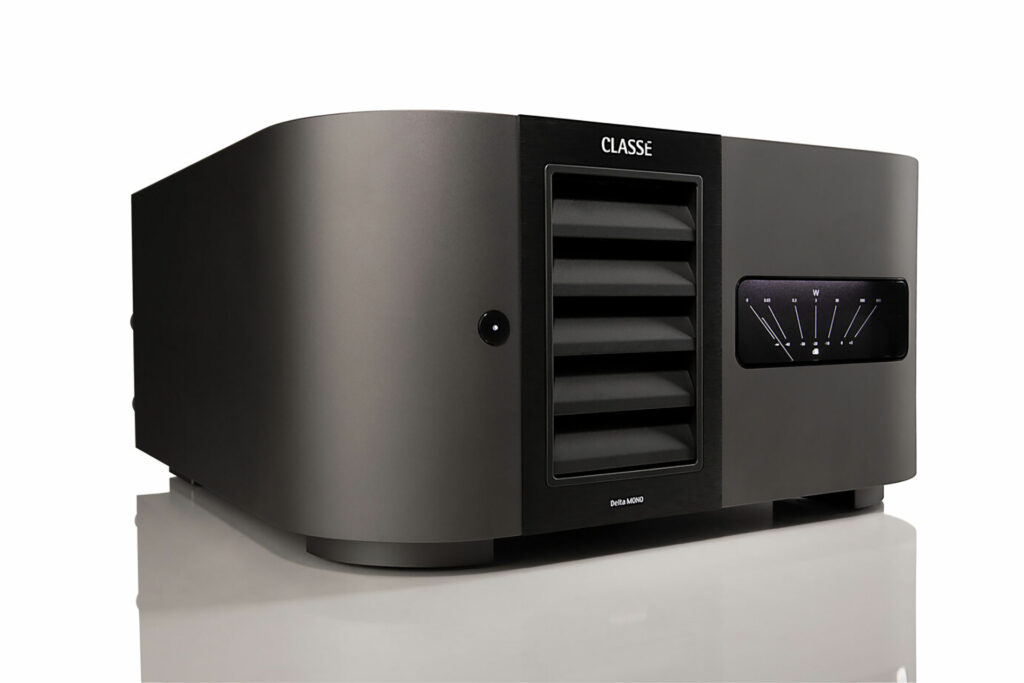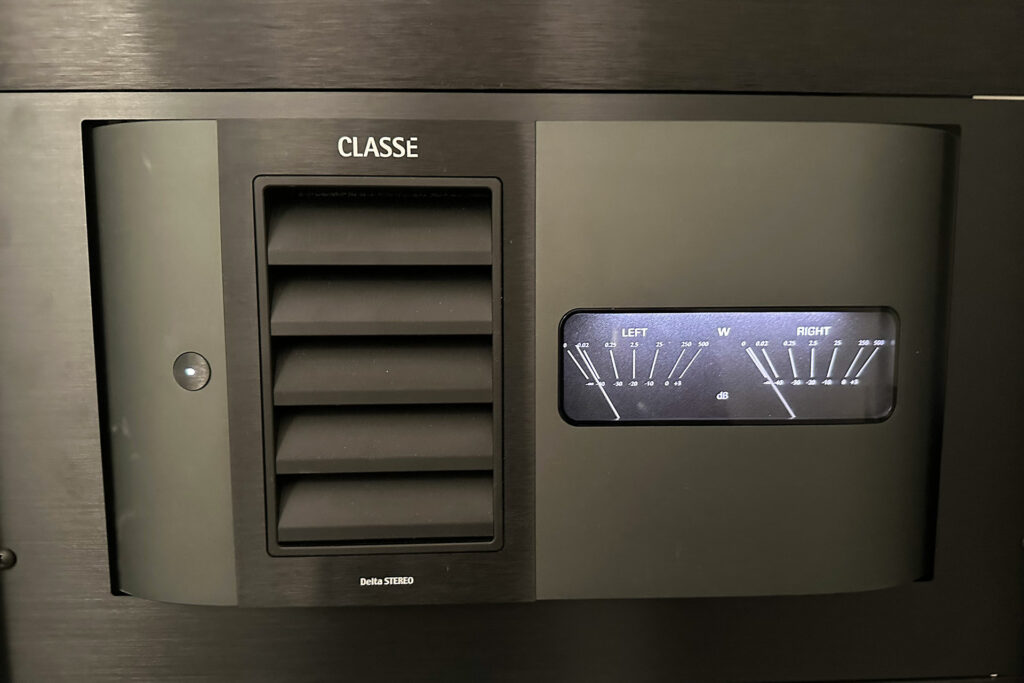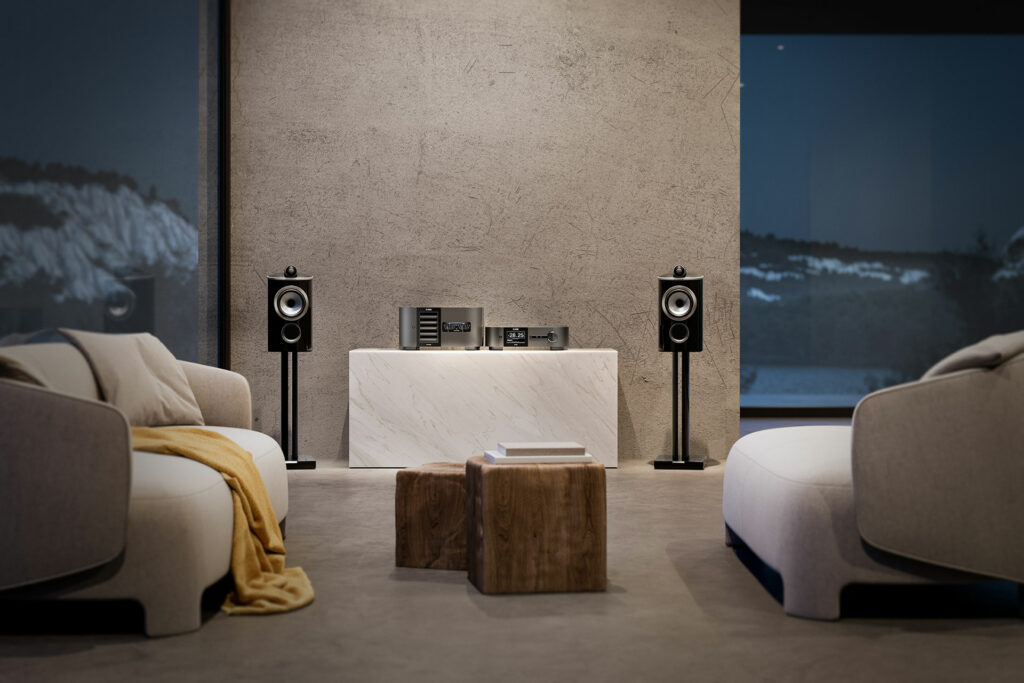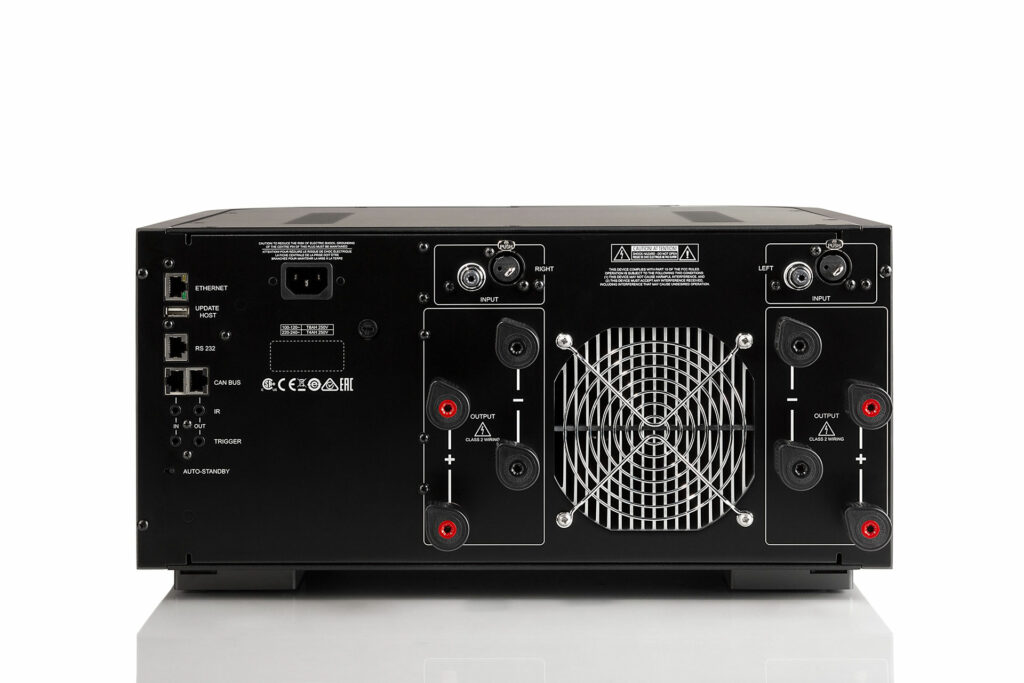Long before Classé became part of Masimo Consumer (the parent company that also owns Polk, Definitive Technology, Denon, Marantz, and Bowers & Wilkins), the company was making some of the highest-performance audiophile components in the market. I’ve owned past versions of the company’s AV or audiophile preamps as well as their multichannel amplifiers, but this is my first look at the company’s latest dedicated stereo electronics. In this case a 250-watt Class-AB power amp with a retail price of $12,999.

What Makes the Classé Delta Stereo Amplifier Special?
- Getting the linearity and clean/warm, tube-like sound for the first dozen watts of power of this Class-AB design gives you wonderful performance for most of the music that you will listen to at reasonable levels. Don’t worry, however, as past the first 12 watts or so, you then have quite a bit of headroom to cover any dynamic peaks that your music requires. 250 watts into 8 ohms is pretty stout by today’s standards.
- Audiophiles make a big deal about meters or gauges on amps like McIntosh, D’Agostino, Pass Labs, and Technics, but you shouldn’t discount the front faceplate look of the Classé Delta Stereo Amp. These meters, while sadly sitting behind a closed door in my equipment rack, look cool as hell when I peek in to check on my system. They also show that I don’t use much power for most of my listening.
- Power consumption on the Delta Stereo amp is modest compared to the Class-A amps it competes with, in that those inefficient beasts draw from the wall as much power as they can get, most of which is converted to heat, not sound. The Delta Stereo amp is much more judicious with its power usage compared to other comparable but vastly different amplifier designs.
- The Delta Stereo amp doesn’t have a signature sound – and that’s a good thing. Audiophile amplifiers should power your speakers without adding any sonic flavor. The Delta Stereo does just that and with lots of headroom and control, just not a sonic flavor.
- The internal parts quality of the Delta Stereo amp are simply first rate. The power supply is really serious in design as well as physically heavy. Classé uses handmade circuit boards, expensive capacitors, fancy feet for absorption, and even more fancy Furutech speaker connectors.
Why Should You Care About the Classé Delta Stereo Amplifier?
This is a power amplifier for a somewhat advanced audiophile who is looking for world-class power to drive some kick-ass speakers. Abbey Road Studios uses Classé electronics (I think they use the monoblock amps). They can use any amplifier that they want, sothe fact they choose Classé speaks volumes.
There are far more expensive amplifiers on the market these days, many from very exotic companies often made in far-away lands. I would warn my audiophile friends that more expensive doesn’t guarantee better performance. Scarcity has a lot to do with why things cost what they do. Look at the wine industry. Some of the most lauded wineries get all of the positive press but don’t always grow that many grapes, which makes the price go up and up when other similar wines grown in the same terroir (environment) can taste just as good for a fraction of the price.
The Classé Delta Stereo Amp is a goldilocks product in that in no reasonable world can we call a $13,000 amplifier a bargain, but there are many comparable amps that are all the rage these days that cost many times more. With that said, I can think of a number of amps that cost less than half the price of the Classé Delta Stereo that are worthy of consideration. Remember, with this level of build quality, the cost of labor in Canada, parts cost on transformers and power supplies – it can be hard to keep the costs down. Classé delivers this amp right in the middle of the fray for high-end power amplifiers.

Some Things You Might Not Like About the Classé Delta Stereo Amplifier
- The Delta Stereo is a physically beast and if you rack-mount your gear, this over-100-pound chassis is going to require two people to hoist. Classé does have a rack-mount kit that allows you to cleanly and safely install such a heavy power amp into a rack, which is very welcomed.
- The Delta Stereo comes in a dark gray finish, not the more Apple-off-white look of the past. I like the look of silver and white electronics better, but I guess I understand that the costs and logistics of dealing with two colors for a power amp like this is just something that runs the prices up. And don’t get me wrong, this is a handsome amplifier; I just prefer the white or silver look.
- Heat is always an issue, so consider how you install an amp like the Delta Stereo. I’ve used many an audiophile power amplifier that creates more heat than this one, but that doesn’t mean that you shouldn’t think about how you are going to get some airflow to this powerhouse. In my case, the Delta Stereo runs behind closed doors but has two levels of forced air coming into my mechanical room, including dozens of tiny fans at the top of the rack as well as two Panasonic heat-activated ventilation fans in the ceiling, which take the hot air and pump it into my attic. Installing a Classé Delta Stereo amp in an equipment rack with even an inch or two of space will do wonders, as the amp doesn’t run crazy-hot but you want it to never get crazy.
Listening to the Classé Delta Stereo Amp…
On Sting’s “Fortress Around Your Heart” from the Fields of Gold best-of album, you don’t have to listen past first few seconds of the opening to hear the benefits of this Class-AB design. The higher frequency details of the cymbals sound accurate but never bright. The little guitar chords dance in the air in front of my Bowers & Wilkins 802 D4 speakers in a wonderfully controlled, open-sounding musical experience. Later in the song’s multiple choruses, the more dynamic drums and cymbals take the amp out of Class-A mode but I only know that because I got up and looked at the meters as the transition from Class-A operation into Class-AB was sonically not detectable.
On “Get Up Stand Up” from Bob Marley’s Legend Compilation, the opening drum hits and various other more delicate percussion stands out notably with the Delta Stereo amplifier in the signal chain. The vocal harmonies were of note on “I Shot the Sheriff,” as they present themselves as layered yet somewhat warm as I believe was the intention of the engineers. The space in the recording comes through nicely with the Delta Stereo in the mix. The organ has a round and warm sound that is very believable, but the space around the instruments is the best take-away from this definitive reggae anthem.
Pushing the volume a bit, I cued up “Making A Fire” from Foo Fighters’ Medicine At Midnight. The now-departed Taylor Hawkins’ drum intro sets the stage for the musical dynamic window to explode into a full chorus of background singers that at a good volume really comes across as a powerful musical experience as the entire soundstage holds up sonically as if it is welded together. There’s a lot going on here and the Delta Stereo amp kinda laughs and says “is that all you got”?
Does the Classé Delta Stereo Amp Have Good Resale Value?
If past history is an indicator of future performance, the Delta Stereo should hold up pretty well in the resale market. Its weight makes it less than desirable to ship but not a deal breaker by any means. The Delta Stereo is built to last and performs like a rock star. Somebody wants this amp if you don’t.

What Other Audiophile Amps Compete With the Classé Delta Stereo?
Bricasti’s M15 stereo amplifier ($15,000) is a worthy competitor. Bricasti is one of our favorite audiophile brands out there having been born from the implosion of Lexicon. Bricasti’s reverb is the professional audio industry’s standard today. Their audiophile gear is equally as good as you get in a fully balanced, low distortion design. You get an awful lot of the performance of Bricasti’s $30,000 monoblock M30 amps for about half of the price here.
Pass Labs XA-25 ($5,150 – read the review) is an amp that sits right above the Classé Delta Stereo amp in my rack. Designed by the legendary amp guru Nelson Pass, this Class-A amp uses a lot of power but outputs some of the cleanest sound you will ever experience. Many fans of Nelson suggest that one of his smaller amp designs is actually one of his best. At this price (and without the sexy-ass gauges found on higher-end Pass Labs amps) you can’t help but to see the value.
If you were looking to get a little out of the box, there are two amplifiers that we are uniquely fond of these days, which is the AGD Productions Tempo (read the review) Gallium Nitride (learn more about GaN) amp at $5,000 and the AMPED 2400 ($5,000), which is also a high -switching-frequency Class-D amp, but like the $30,000 Jeff Rowland design, uses a Pascal chip at the heart of this amp. The AMPED design puts out more power. Both are excellent performers and great values. We like that you can bridge the AGD Tempo for an upgrade path if you felt that you needed more power. Both are much lower cost and highly disruptive products in the audiophile space in 2023 worthy of consideration even at less than half of the retail price.
There are an awful lot of excellent power amplifiers to consider in the $10,000 to $15,000 range, with many being from some of the best audiophile electronics manufacturers in the world. The above list is a compelling selection of somewhat off-the-beaten-path options but you will not have a hard time finding other blue-chip options, too.

Final Thoughts on the Classé Delta Stereo Amplifier
The Classé Delta Stereo amplifier is a rock-solid performer priced at $13,000. You get amazing build quality, a long-term dedication to audiophile engineering excellence, top mastering lab pro audio credibility, and so much more. The Delta Stereo isn’t flavored or colored sonically, so what you get is an amp that can power anything from my Bowers & Wilkins 802 D4s to my other pair of Revel 328BE speakers, which are even harder to drive. The Delta Stereo has so much power that nearly every respectable audiophile speaker in the market today can be successfully powered by this Classé power amp.
If control, accuracy, and a colorless sound is what you are looking for from an amazingly well-built, gorgeous amplifier, then perhaps you have found your solution.



